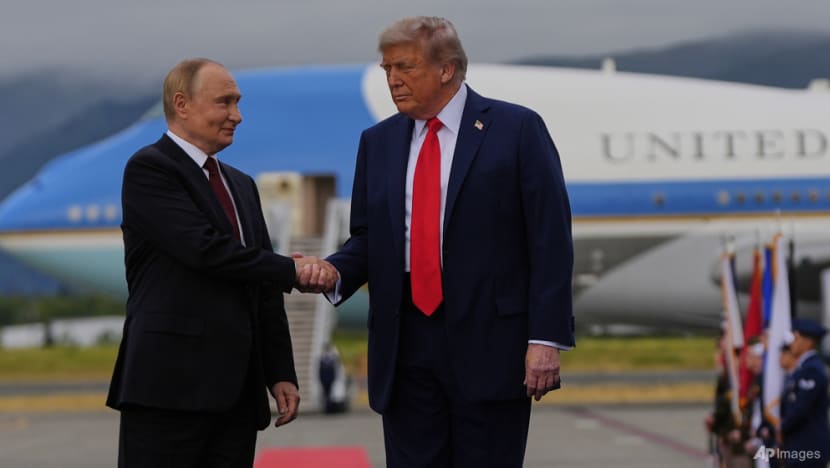Snap Insight: Trump caves to Putin yet again at Alaska summit
US President Donald Trump and his Russian counterpart, Vladimir Putin, were eager to portray their encounter as successful, but it is clear that significant differences remain between them, says international security professor Stefan Wolff.

President Donald Trump greets Russia's President Vladimir Putin, Aug 15, 2025, at Joint Base Elmendorf-Richardson, Alaska. (AP Photo/Julia Demaree Nikhinson)

This audio is generated by an AI tool.
BIRMINGHAM, United Kingdom: The only certainty after a three-hour meeting between US President Donald Trump and his Russian counterpart, Vladimir Putin, in Alaska on Friday (Aug 15) is that there is no ceasefire in the war between Russia and Ukraine.
This is bad news for Ukraine, which has been under assault for three-and-a-half years.
By contrast, it is a clear victory for Russia, and a personal triumph for Mr Putin. Not only can he now continue his air and ground campaigns against Ukraine, but he has also been able – again – to avoid Mr Trump’s threats of “very severe consequences” in the absence of a Russian agreement to a ceasefire.
Add to that the prestige of an invitation to the United States and the warm personal welcome he received from Mr Trump, and it is obvious that Mr Putin is very much in control of events on and off the battlefield.
The outcome of the highly anticipated meeting does not reflect well on the American president either. If anyone had any faith left in his deal-making prowess, it would have been severely diminished – if not completely evaporated – after Friday's events. Despite Mr Trump’s apparent commitment to get tough on Russia if there was no ceasefire, he appears to have caved in yet again to Mr Putin.
Both presidents were eager to portray their encounter as productive and successful, but from their brief statements to the press afterwards, it was clear that there remained significant differences between them.
While Mr Putin emphasised progress in rebuilding relations with the United States, Mr Trump was clear that “some headway” had been made but that there was “no deal” yet. Both presidents teased the possibility of a follow-up meeting, possibly in Moscow, but nothing concrete to this effect was agreed.
WHERE THIS LEAVES UKRAINE AND EUROPEAN ALLIES
Where does this leave Ukraine and its European allies? The good news is that no deal was made over their heads or – as far as is known – behind their backs.
Mr Trump noted that “significant” differences remained on the path to a ceasefire. This is likely a reference to the gap between what Russia and Ukraine are willing to accept in a future settlement, with Moscow’s demands for Kyiv to recognise occupied territories as Russian the most serious stumbling block.
In his subsequent interview with Fox News, Mr Trump advised the Ukrainian president, Volodymyr Zelenskyy, to “make a deal” because “Russia is a very big country, and they are not”.
Whether this is merely Mr Trump parroting a well-worn Russian speaking point – that Moscow will ultimately prevail over Kyiv in a war of attrition – or whether it is his genuinely held belief is almost immaterial. But it signals that Mr Trump is yet again pivoting away from supporting Ukraine in its quest for a just peace.
For now, the American president has not completely abandoned his efforts to bring peace to Ukraine. But he has put the onus on Mr Zelenskyy without offering any of the reassurances that were given to him and other European leaders only days ago. Mr Zelenskyy reportedly had a lengthy conversation with Mr Trump after the Alaska meet, and will meet his American counterpart in Washington DC on Monday.
Mr Trump’s deal-making is very much premised on the idea of “winner takes all”. Unfortunately for him, and above all Ukraine, he has left Alaska empty-handed and Mr Putin with a big smile on his face.
Stefan Wolff is Professor of International Security at the University of Birmingham and Head of the Department of Political Science and International Studies.
















